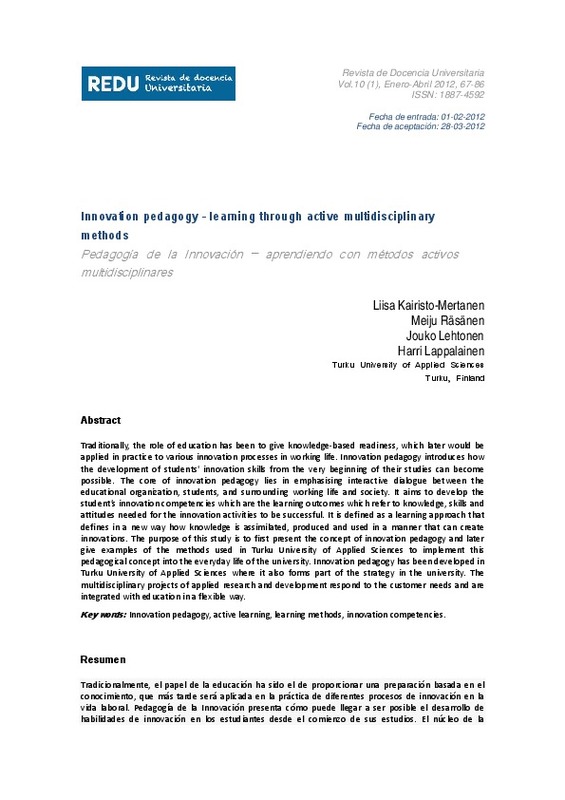Brady, L. (1996). Outcome‐based Education: a critique, in The Curriculum Journal, Vol 7 (1), Spring, 5‐16.
Buss, D. (2008). Secret Destinations, in Innovations in Education and Teaching International, Vol 45 (3), August, 303‐308.
Davies, A. (2002). Writing learning outcomes and assessment criteria in art and design, available at www.arts.ac.uk/docs/citad_learningoutcomes.pdf pp. 522‐529. (Accessed 15 May 2011).
[+]
Brady, L. (1996). Outcome‐based Education: a critique, in The Curriculum Journal, Vol 7 (1), Spring, 5‐16.
Buss, D. (2008). Secret Destinations, in Innovations in Education and Teaching International, Vol 45 (3), August, 303‐308.
Davies, A. (2002). Writing learning outcomes and assessment criteria in art and design, available at www.arts.ac.uk/docs/citad_learningoutcomes.pdf pp. 522‐529. (Accessed 15 May 2011).
Finland's National Innovation Strategy (2008). http://www.tem.fi/files /19704/Kansallinen_innovaatiostrategia_12062008.pdf.
Gibbons M., Limoges C., Nowotny H., Schwartzman S., Scott P. & Trow, M. (1994). The New Production of Knowledge. The dynamics of science and research in contemporary societies. London: Sage.
Harden, R. M. (2002). Learning outcomes and instructional objectives: is there a difference, in Medical Teacher, Vol. 24 (2), 151‐155.
Harden. R. M., Crosby, J. R. & Davis, M. H. (1999). An Introduction to Outcome Based Education, in AMEE Guide No. 14, part 1. Medical Teacher
Hussey, T. & Smith, P. (2008). Learning outcomes: a conceptual analysis, in Teaching in Higher Education, Vol 13 (1), February, 107‐115.
Kairisto‐Mertanen, L.; Kanerva‐Lehto, H.; Penttilä, T. (2009). Kohti innovatiopedagogiikkaa - Uusi lähestymistapa ammattikorkeakoulujen opetukseen ja oppimiseen. Turun ammattikorkeakoulun raportteja 92, Tampereen yliopistopaino, Tampere.
Kairisto‐Mertanen, L.; Penttilä, T. & Putkonen, A. (2010). Embedding innovation skills in learning, in Innovation and Entrepreneurship in Universities, ed. Marja‐Liisa Neuvonen‐Rauhala; Series C Articles, reports and other current publications, part 72, Lahti University of Applied Sciences; Tampereen yliopistopaino, Tampere.
Kairisto‐Mertanen, L.; Penttilä, T. & Nuotio, J. (2011). On the definition of innovation competencies, in Innovations for Competence Management, Conference proceedings. eds. Torniainen; Ilona, Mahlamäki‐Kultanen, Seija, Nokelainen Petri & Paul Ilsley; Series C, reports and other current publications, part 83, Lahti University of Applied Sciences, Esa print Oy.
Kanerva‐Lehto, H.; Lehtonen, J.; Jolkkonen, A. & Riihiranta, J. (2011). Research Hatchery - a Concept for Combining Learning, Development and Research. In Towards Innovation pedagogy. A new approach to teaching and learning in universities of applied sciences, ed. by Lehto, A., Kairisto‐Mertanen L., Penttilä, T. TUAS Reports 100. Turku University of Applied Sciences.
Kanerva‐Lehto, H. & Lehtonen, J. (ed.) 2007. Tutkimuspaja - oppimista ja kehittämistä. Reports from Turku University of Applied Sciences 54. Turku: Turku University of Applied Sciences.
Lehtonen, J., Kanerva‐Lehto, H. & Koivisto, J. 2006. Tutkimuspaja mahdollisuutena yhdistää opetus ja T&K. Comments from Turku University of Applied Sciences 24. Turku: Turku University of Applied Sciences.
Kettunen, J. (2011). Innovation pedagogy for universities of applied sciences, in Creative Education, 2(1), pp. 56‐62.
Kettunen, J. (2010). Strategy process in higher education, in Journal of Institutional Research, 15(1), 16‐27.
Kettunen, J. (2009). Innovaatiopedagogiikka, Kever‐verkkolehti, 8(2), available at http://ojs.seamk.fi/index.php/kever/article/view/1123/1000. (Accessed 24 June 2011).
Lyytinen, S. (2011). Project Hatchery - interdisciplinary learning through project methods, In Towards Innovation pedagogy. A new approach to teaching and learning in universities of applied sciences, ed. by Lehto, A., Kairisto‐Mertanen L., Penttilä, T. TUAS Reports 100. Turku University of Applied Sciences.
Nonaka I. & Takeuchi H. (1995). The Knowledge Creating Company: How Japanese Companies Create the Dynamics of Innovation. New York: Oxford University Press.
Nowotny, H., Scott, P.and Gibbons, M. (2001). Re‐Thinking Science. Knowledge and the Public in an Age of Uncertainty. London: Polity Press.
Nowotny H., Scott P. & Gibbons M. (2003). 'Mode 2' Revisited: The New production of Knowledge. Minerva 41(3), 179 - 194.
Nusche, D. (2008). Assessment of learning outcomes in higher education: A comparative review of selected practices, in OECD Education Working Paper No. 15. Paris: OECD.
Penttilä, T.; Kairisto‐Mertanen, L. & Putkonen, A. (2011). Messages of innovation pedagogy, In Towards Innovation pedagogy. A new approach to teaching and learning in universities of applied sciences, ed. by Lehto, A., Kairisto‐Mertanen L., Penttilä, T. TUAS Reports 100. Turku University of Applied Sciences.
Proitz, T. S. (2010). Learning outcomes: What are they? Who defines them? When and where are they defined, in Educational Assessment, Evaluation and Accountability, 22, 119‐137.
Putkonen, A.; Kairisto‐Mertanen, L.; Penttilä, T. (2010). Enhancing engineering students' innovation skills through innovation pedagogy - experiences in Turku University of Applied Scieces, In International Conference on Engineering Education ICEE‐2010, July 18‐22, 2010, Gliwice, Poland.
Rogers E. M. (2003). Diffusion of Innovations. Fifth edition. New York: Free Press.
Schumpeter J. A. (2003). Entrepreneurship, Style and Vision. Backhaus, J. G. (ed.) Boston: Kluwer Academic Publishers.
Spady, W. (1988). "Organizing for the results: The basis of authentic restructuring and reform", in Educational Leadership, 4‐8.
Spitzberg, B. (1983). Communication competence as knowledge, skills and impression, in Communication Education, Vol. 32, July, 323‐329.
[-]








